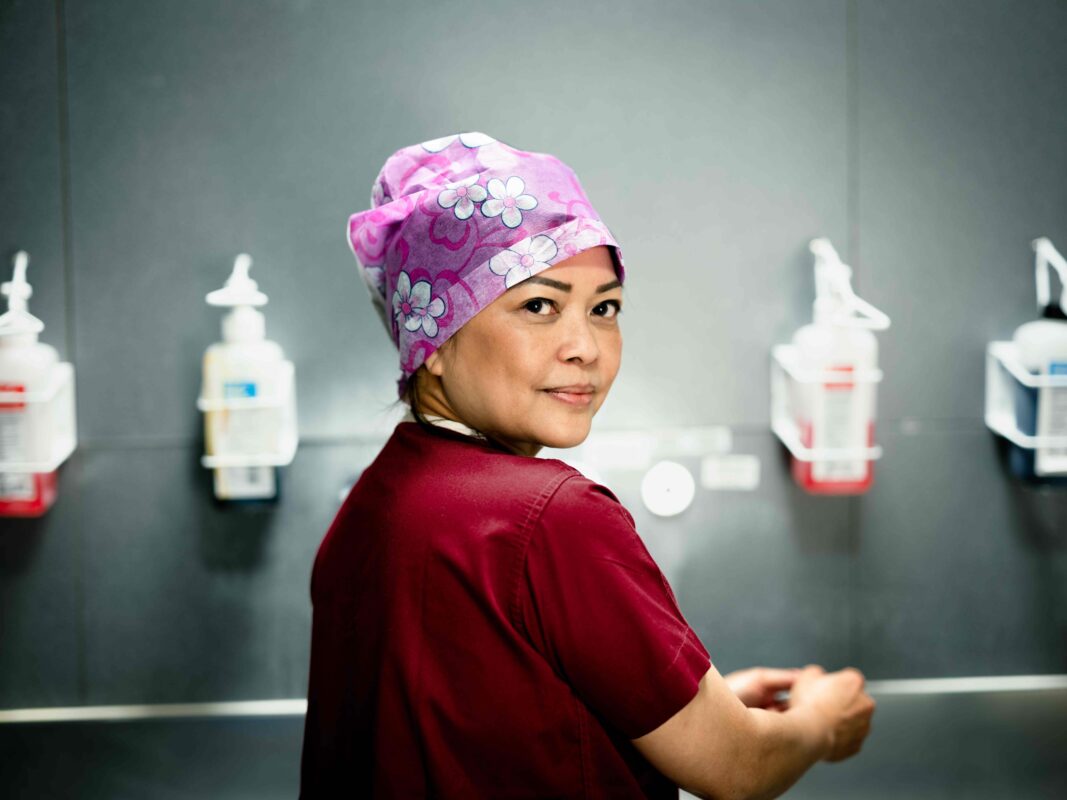The invaluable contribution of migrant workers to the UK’s National Health Service is recognised in a new collection of portraits
A moving portrait series by photographer and Oscar-nominated director JJ Keith has been released, celebrating the pivotal role migrant workers play in keeping the UK’s National Health Service (NHS) running.
He has teamed up with Imperial College Healthcare NHS Trust as part of his wider Open Britain: Portrait of a Diverse Nation project. The latest collaboration features 23 NHS workers from the trust, all of whom contribute to keeping the NHS running. All, from porters to trauma surgeons, are first-generation migrants.
It is estimated that 17% of the NHS workforce are non-British nationals but the figure for first generation migrants is likely to be even higher. The NHS is under severe pressure, as highlighted by a recent report by Lord Dazi. Arguably it may have already failed without the sacrifices many of these people make in moving to the UK.
The series came after following a chance meeting of JJ Keith and one of the paediatricians who works at the trust, Prof Bob Klaber. “Healthcare has people at its heart – our patients, the communities we serve and the wonderful staff who deliver the care,” said Prof Klaber. “JJ’s beautiful portraits bring to life the remarkable stories of so many of our incredible colleagues who have brought their compassion, kindness and expertise, from across the globe, to everything we do across our hospitals.”
JJ Keith told Positive News that he wanted people to be reminded of the diversity within the NHS, and how important these workers are. “The feelings and thoughts I want to inspire are as diverse as the people and stories themselves but if I had to pick just one it would be gratitude,” he said.
Through the ongoing project Open Britain: Portrait of a Diverse Nation, Keith has spent 18 months documenting the lives and experiences of more than 130 first-generation migrants, showcasing the ‘rich tapestry of cultures that make up the fabric of British society’.
Below, we share five stories from the latest collaboration with Imperial.
‘Compassion, kindness and expertise, from across the globe’
Jimmy Jombla – midwife, Queen Charlotte’s & Chelsea Hospital

Jimmy Jombla – midwife, Queen Charlotte’s & Chelsea Hospital
Jimmy Jombla was born in Moyamba Town, Sierra Leone in 1982. He fled the war in 1997 to come to the UK as a refugee.
Growing up in Sierra Leone Jombla fondly remembers his Aunt Agnes Jombla running a private maternity unit. Agnes used to look after Jombla and his brother Tommy. As children, they were allowed to hang around the delivery rooms and Agnes used to inform them what to do when a woman was in labour. In return for midwifery services, patients would trade food and other goods.
Jombla studied nursing in the UK and was placed in the maternity unit in Whittington Hospital as part of his degree. While following his mentor midwife, the sights and sounds triggered the memories of his Aunt Agnes. There and then he knew his calling was to follow in her footsteps and “to attend to mothers, giving them the requisite information and the psychological, physical and social care that they need”.
Rhona Eslabra – matron/theatre manager for St Mary’s and Western Eye hospitals

Rhona Eslabra was born in the Cagayan Valley in the Philippines. Rhona was 30 when the NHS recruited her to come to UK, leaving her baby daughter and husband behind.
The shift in working environment and more importantly the culture, can make it very difficult for migrant nurses to progress and can affect their confidence. Eslabra arrived as an adaptation nurse, meaning that mentors make an informed decision as to whether one can be signed off as a registered nurse and eventually get their Nursing and Midwifery Council registration.
Eslabra has done well to advance to the position as matron and continues to widen her capabilities and enhance her expertise. She’s currently completing her ‘Go further’ healthcare leaders fellowship – a targeted leadership development programme to develop and nurture talent in our healthcare professionals from BAME backgrounds. This is important with such a diverse workforce.
Her daughter followed her to the UK and recently completed her medicine degree. She will join St Mary’s Hospital in August as a doctor.
Zubeid Namigul – associate pathology practitioner, Charing Cross

Zubeid Namigul was born in Peshawar, Pakistan in 2000. His parents fled Afghanistan for Pakistan during the Soviet war as refugees and moved to the UK when he was seven.
Namigul graduated in biomedical sciences in 2022 and now works in cellular pathology, providing tissue samples for consultants to make their diagnosis.
Coming from a traditional Muslim background, Namigul had the choice of whether he wanted an arranged marriage or not and was introduced to his bride on Zoom. They got to know each other remotely over three years before Namigul travelled to Afghanistan in 2021 to meet her and marry.
Namigul was meant to stay for three months to arrange his wife’s papers for the UK but 18 days in – on his wife’s birthday – there was a change of government and the Taliban took over. Namigul and his wife were evacuated on a military plane. The sudden uprooting has meant it’s been a tough assimilation process for Namigul’s wife, but they now have a nine-month-old daughter to focus their attention on and keep them busy.
Maryam Alfa-Wali – trauma surgeon, St Mary’s Hospital

Maryam Alfa-Wali moved to the UK as a child from Kano, Northern Nigeria, with her parents and nine siblings. When her parents moved back (her father worked for the Nigerian government), Alfa-Wali chose to stay to pursue medicine at Cardiff University and embark on her specialist surgical training in London.
After she tragically lost friends at university in a road traffic collision, she knew she wanted to become a trauma surgeon. At the time, the UK lacked formal training programmes for trauma surgeons, unlike the US. She completed a PhD and got experience in general surgery before seeking further training in trauma surgery at the Royal London Hospital under renowned specialists.
After graduating from medical school, Alfa-Wali has dedicated over two decades to her surgical career, overcoming numerous hurdles. Most of her siblings have moved back to Nigeria but Alfa-Wali has stayed to face a more challenging way of life here both in the NHS and in day-to-day life, including putting together Ikea flatpack furniture, she jokes.
Albert King – decontamination supervisor in the endoscopic processing unit, Hammersmith Hospital

Albert King was born in Kinshasa in the Democratic Republic of Congo. He came to study in the UK in the early 1980s.
After studying English at Abbey Missionary School in London, he went on to study theology and religious studies at the University of Cambridge. During an open day at the Addenbrooke’s Hospital, King became very interested in surgery and theatre. He was drawn to working in a hospital and “saving lives, seeing people coming in sick and leaving healthy”.
He trained and qualified as a medical decontamination technician, before being assigned to theatres to reprocess the medical-surgical devices and theatre equipment, making sure they are decontaminated and safe for surgery.
King works at Hammersmith Hospital from Monday to Thursday, and from Friday to Sunday he works as a religious minister at Elim Community Church – moving between physical and spiritual wellbeing.
To find out more about the collaboration between JJ Keith and Imperial College Healthcare NHS Trust, click here
All images by JJ Keith
Be part of the solution
Positive News is helping more people than ever to get a balanced and uplifting view of the world. While doom and gloom dominates other news outlets, our solutions journalism exists to support your wellbeing and empower you to make a difference towards a better future.
But our reporting has a cost and, as an independent, not-for-profit media organisation, we rely on the financial backing of our readers. If you value what we do and can afford to, please get behind our team with a regular or one-off contribution.
Give once from just £1, or join 1,400+ others who contribute an average of £3 or more per month. You’ll be directly funding the production and sharing of our stories – helping our solutions journalism to benefit many more people.
Join our community today, and together, we’ll change the news for good.

